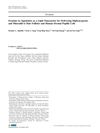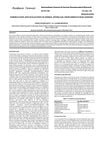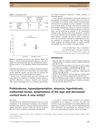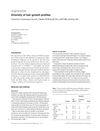 May 2023 in “Research Square (Research Square)”
May 2023 in “Research Square (Research Square)” Shi-Bi-Man activates hair follicle stem cells and promotes hair growth by changing lactic acid metabolism and other cellular processes.

Deleting Smad4 and PTEN genes in mice causes rapid, invasive stomach cancer.

Deleting Smad4 and PTEN genes in mice causes rapid, invasive forestomach cancer.

Fire needle therapy's benefits and safety for alopecia areata need more evidence.
 July 2020 in “bioRxiv (Cold Spring Harbor Laboratory)”
July 2020 in “bioRxiv (Cold Spring Harbor Laboratory)” The structure of SRD5A reveals how it reduces steroids, aiding drug design for related health conditions.
 January 2019 in “ISGE series”
January 2019 in “ISGE series” Estrogen helps prevent artery plaque by stopping monocyte capture in blood vessels.
 April 2018 in “The journal of investigative dermatology/Journal of investigative dermatology”
April 2018 in “The journal of investigative dermatology/Journal of investigative dermatology” Double-stranded RNA helps regenerate hair follicles by increasing retinoic acid production and signaling.
 January 2017 in “Brazilian Journal of Pharmaceutical Sciences”
January 2017 in “Brazilian Journal of Pharmaceutical Sciences” Arteannuin might work against cancer and Alzheimer's by targeting neprilysin.


The hydrogel with 20% Hibiscus rosa-sinensis extract was the best for potential therapeutic use.
 January 2013 in “Journal of dermatology”
January 2013 in “Journal of dermatology” A new medical syndrome may include skin changes, hair loss, sweating issues, bone malformations, leg swelling, and low cortisol.
 April 2012 in “Journal of the American Academy of Dermatology”
April 2012 in “Journal of the American Academy of Dermatology” Dermoscopy can help diagnose tinea capitis in children by looking for comma hairs, black dots, and broken hairs with white bands.

Infliximab was effective in treating a scalp condition that did not respond to other treatments.

About 17% of people in France have dandruff, and those with dandruff are more likely to have sensitive and itchy scalps.
 421 citations,
April 2012 in “The New England Journal of Medicine”
421 citations,
April 2012 in “The New England Journal of Medicine” Alopecia Areata is an autoimmune condition causing hair loss with no cure and treatments that often don't work well.
 198 citations,
April 2020 in “Journal of Endocrinological Investigation”
198 citations,
April 2020 in “Journal of Endocrinological Investigation” The virus was not found in the semen and urine of a man who tested positive for COVID-19.
 192 citations,
April 2019 in “ACS nano”
192 citations,
April 2019 in “ACS nano” A new microneedle patch made from hair proteins helps regrow hair faster and better than current treatments.
 185 citations,
August 2020 in “Mayo Clinic Proceedings”
185 citations,
August 2020 in “Mayo Clinic Proceedings” Men are more likely to have severe COVID-19 cases and fatalities than women due to factors like lifestyle, aging, and biological differences.
 169 citations,
September 2010 in “Molecular & cellular proteomics”
169 citations,
September 2010 in “Molecular & cellular proteomics” Pectin biosynthesis is essential for the growth of cotton fibers and Arabidopsis root hairs.
 153 citations,
March 2017 in “Endocrine”
153 citations,
March 2017 in “Endocrine” Male pattern baldness involves genetics, hormones, and needs better treatments.
 150 citations,
January 2018 in “Burns & Trauma”
150 citations,
January 2018 in “Burns & Trauma” Bioprinting could improve wound healing but needs more development to match real skin.
 134 citations,
January 2019 in “American journal of clinical dermatology”
134 citations,
January 2019 in “American journal of clinical dermatology” Antibiotics can reduce acne but may lead to resistant bacteria, and understanding the skin's bacteria is important for treatment.
 123 citations,
May 2020 in “Drug Development Research”
123 citations,
May 2020 in “Drug Development Research” Men's sensitivity to male hormones might affect how severe COVID-19 gets for them.
 117 citations,
March 2017 in “Nature Communications”
117 citations,
March 2017 in “Nature Communications” Macrophages help regrow hair by activating stem cells using AKT/β-catenin and TNF.
 115 citations,
September 2005 in “International Journal of Dermatology”
115 citations,
September 2005 in “International Journal of Dermatology” Different ethnic groups have unique hair growth patterns, with African hair growing slower and less dense, Asian hair growing fast but sparse, and Caucasian hair being densest; men are more likely to experience hair loss than women.
 89 citations,
October 1996 in “Dermatologic Clinics”
89 citations,
October 1996 in “Dermatologic Clinics” Alopecia areata is likely caused by a combination of genetic factors and immune system dysfunction, and may represent different diseases with various causes.
 86 citations,
January 2008 in “Journal of nutritional & environmental medicine”
86 citations,
January 2008 in “Journal of nutritional & environmental medicine” Green tea may help with health issues like cancer, heart disease, and weight loss due to its high catechin content.
 82 citations,
October 2019 in “Frontiers in Immunology”
82 citations,
October 2019 in “Frontiers in Immunology” Changes to the Foxp3 protein affect how well regulatory T cells can control the immune system, which could help treat immune diseases and cancer.
 81 citations,
June 2010 in “Journal of Dermatological Treatment”
81 citations,
June 2010 in “Journal of Dermatological Treatment” The document concludes that minoxidil and finasteride are proven for hair growth, herbal remedies show promise, but more research is needed to confirm their effectiveness.
 76 citations,
January 2019 in “Nanoscale”
76 citations,
January 2019 in “Nanoscale” Created material boosts hair growth and kills bacteria for wound healing.





























